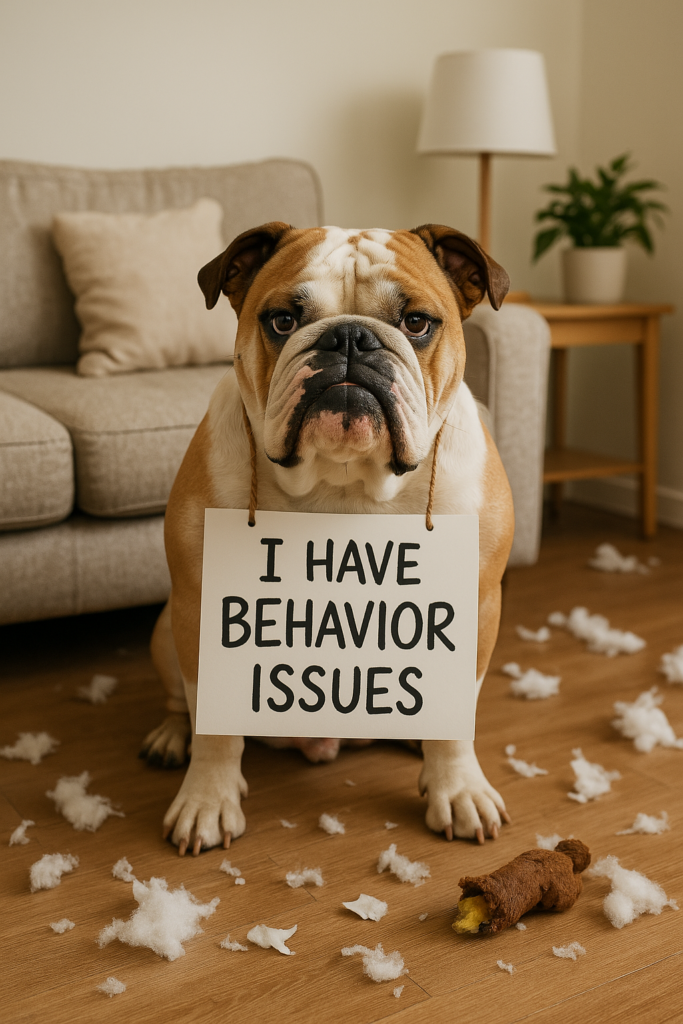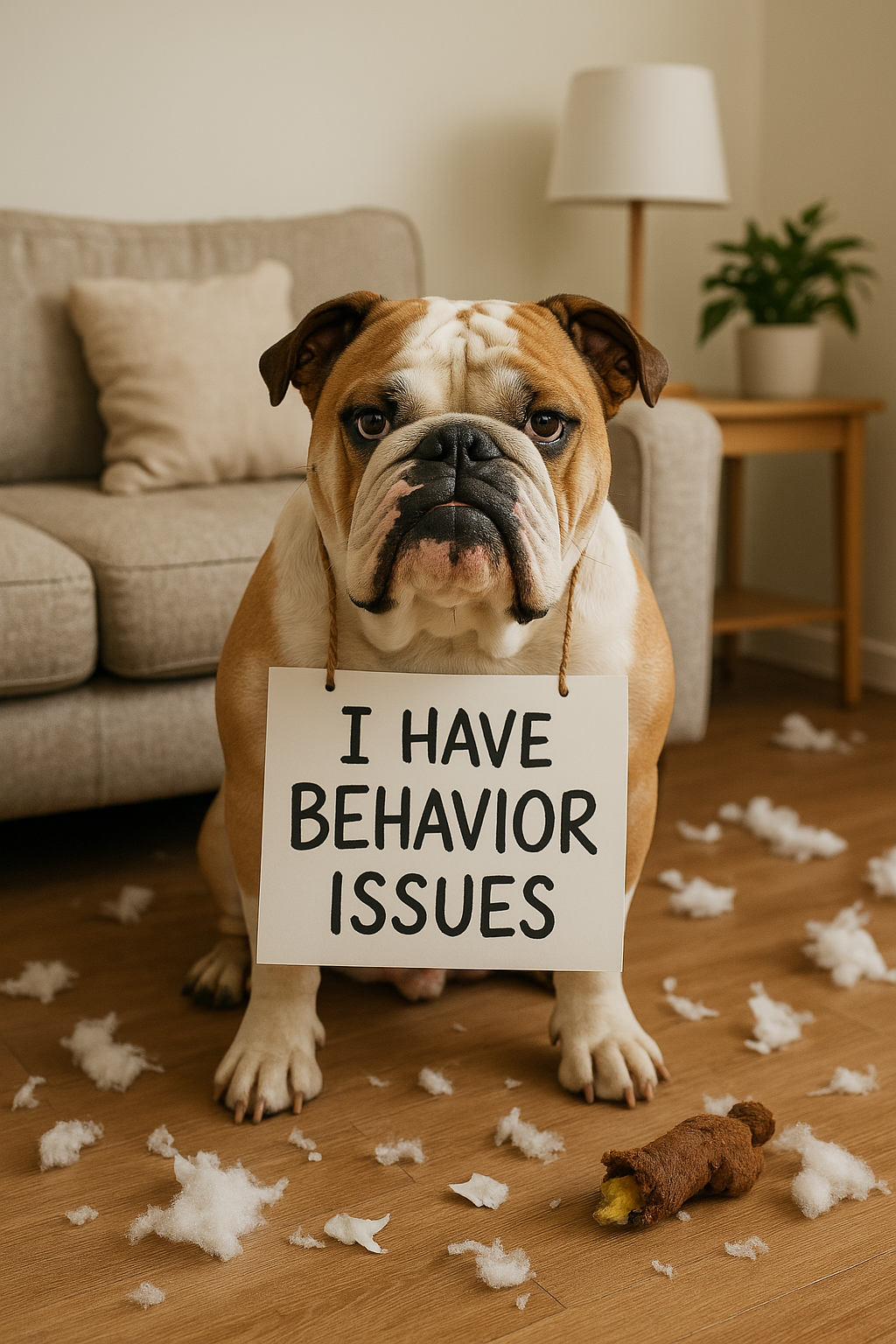Your cart is currently empty!

Bulldog Behavior Management.
Bulldogs are affectionate and intelligent dogs with a sensitive side. Unfortunately, their loyalty and deep bonds with their humans make them particularly vulnerable to behavioral issues and anxiety. From separation anxiety to noise phobias, Bulldogs can display various stress responses that impact their well-being.
This bulldog behavior management guide explores the causes, diagnostic cues, at-home behavior therapy techniques, when to involve professionals, and evidence-based solutions—including natural remedies and supplements.
Common Causes of Anxiety in Bulldogs
Understanding the source of anxiety is the first step toward effective treatment. Common triggers include:
1. Separation Anxiety
- One of the most prevalent forms in Bulldogs.
- Triggered when left alone or away from their human companions.
2. Noise Phobia
- Sudden loud sounds (thunder, fireworks, vacuum cleaners) can cause panic.
3. Change in Environment
- Moving homes, new people/pets, or changes in routine may lead to stress.
4. Lack of Socialization
- Poor social exposure during puppyhood can result in fear-based behaviors later in life.
5. Past Trauma or Neglect
- Bulldogs adopted from shelters or with an unclear background may carry behavioral scars.
6. Pain or Illness
- Underlying medical issues (like arthritis or ear infections) can mimic or worsen anxiety.
Recognizing Behavioral and Anxiety Symptoms
Behavioral Red Flags:
- Destructive chewing or digging
- Barking, whining, or howling excessively
- Pacing or restlessness
- Accidents in the house despite being potty trained
- Hiding or cowering
- Aggression toward people or animals
Observation Methods:
- Keep a journal of triggers and behavior patterns.
- Use pet cameras to monitor behavior when alone.
- Rule out medical causes with a veterinary exam.
At-Home Bulldog Behavioral Therapy Strategies
1. Desensitization and Counter-Conditioning
- Gradually expose your Bulldog to the trigger in a safe, low-intensity way.
- Pair with treats or praise to build a positive association.
Example: Play a low-volume recording of fireworks during treat time. Slowly increase volume over days or weeks.
2. Calm Environment Training
- Create a safe space with a cozy bed, toys, and calming music (like dog-specific playlists).
- Use positive reinforcement for calm behaviors.
3. Routine and Predictability
- Bulldogs thrive on consistent feeding, walking, and playtime schedules.
4. Enrichment Activities
- Use puzzle toys, snuffle mats, or slow feeders to mentally stimulate your dog and prevent boredom.
5. Crate Training (If Used Correctly)
- Never use crates for punishment. A properly introduced crate can be a secure, comforting space.
Bulldog Behavior Management Supplements and Natural Remedies
Over-the-Counter Calming Aids
- Zylkene – Contains casein (a milk protein) with calming effects.
- Composure Pro – Contains colostrum, L-theanine, and thiamine.
- Adaptil Diffuser or Collar – Releases calming dog pheromones.
Natural Remedies
- CBD Oil – Shown to reduce stress and improve behavior in dogs. Use vet-approved, THC-free versions.
- Chamomile & Valerian Root – Found in calming chews or teas.
- L-theanine (from green tea) – Supports relaxation without sedation.
Reference: Brioschi et al. (2020). Effects of CBD on canine anxiety and arthritis – MDPI Animals
When to Consult a Professional
Seek expert help when:
- Anxiety becomes chronic or worsening
- Your dog shows signs of aggression or self-harm
- At-home strategies don’t improve behavior
- There’s a significant impact on daily functioning
Professionals Who Can Help:
- Veterinarian Behaviorists – For medical + behavioral evaluation.
- Certified Canine Behavior Consultants (CCBC/KPA-CTP) – For custom training plans.
- Trainers Specializing in Fear-Free or Positive Reinforcement – Essential for long-term success.
Prescription Medications (Veterinarian Only)
When natural or behavioral methods aren’t sufficient, medication may help:
- Fluoxetine (Prozac) – An SSRI commonly used for chronic anxiety.
- Trazodone – Used for situational anxiety (e.g., travel, vet visits).
- Clonidine – Helpful for noise phobias and panic reactions.
- Gabapentin – For anxiety with pain-related conditions.
Prevention Strategies for Bulldog Anxiety
- Early Socialization (8–16 weeks) – Introduce varied people, environments, and gentle handling.
- Crate Familiarity Training – Make crate a reward zone from puppyhood.
- Noise Exposure Training – Gradual introduction of everyday sounds.
- Daily Exercise and Mental Games – Balance energy to reduce restlessness.
- Avoid Harsh Discipline – Fear-based training worsens anxiety.
Bulldog Behavioral Care Visual Plan
| Task | Frequency | Tool/Method |
| Positive Training Sessions | 3–5x per week | Clicker + treats |
| Environmental Enrichment | Daily | Puzzle toys, new smells |
| Safe Space Time | Daily (1–2 hours) | Calming music, Adaptil diffuser |
| Noise Desensitization | 2–3x per week | Gradual audio playback |
| Vet Check-up for Underlying Issues | Bi-annually | Full physical exam |
Final Thoughts
Behavioral issues and anxiety don’t make your Bulldog “bad” — they’re just symptoms that need understanding and care. With consistent therapy, calming support, and plenty of love, Bulldogs can thrive emotionally and behaviorally.
